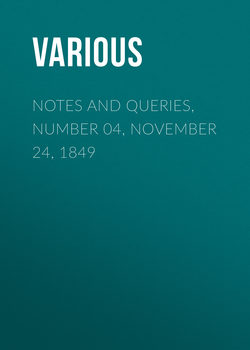Читать книгу Notes and Queries, Number 04, November 24, 1849 - Various - Страница 6
NOTES
ORIGIN OF WORD "GROG"—ANCIENT ALMS-BASINS
ОглавлениеMr. Editor,—As a sailor's son I beg to answer your correspondent LEGOUR'S query concerning the origin of the word "grog," so famous in the lips of our gallant tars. Jack loves to give a pet nickname to his favourite officers. The gallant Edward Vernon (a Westminster man by birth) was not exempted from the general rule. His gallantry and ardent devotion to his profession endeared him to the service, and some merry wags of the crew, in an idle humour, dubbed him "Old Grogham." Whilst in command of the West Indian station, and at the height of his popularity on account of his reduction of Porto Bello with six men-of-war only, he introduced the use of rum and water by the ship's company. When served out, the new beverage proved most palatable, and speedily grew into such favour, that it became as popular as the brave admiral himself, and in honour of him was surnamed by acclamation "Grog."
MACKENZIE WALCOTT, M.A.
P.S.—There are two other alms-basins in St. Margaret's worthy of note, besides those I mentioned in your last number. One has the inscription, "Live well, die never; die well and live ever. A.D. 1644 W.G." The other has the appropriate legend, "Hee that gives too the poore lends unto thee LORD." A third bears the Tudor rose in the centre. In an Inventory made about the early part of the 17th century, are mentioned "one Bason given by Mr. Bridges, of brasse." (The donor was a butcher in the parish.) "Item, one bason, given by Mr. Brugg, of brasse." On the second basin are the arms and crest of the Brewers' Company. Perhaps Mr. Brugg was a member of it. One Richard Bridges was a churchwarden, A.D. 1630-32.
M.W.
7. College Street. Nov. 17.
